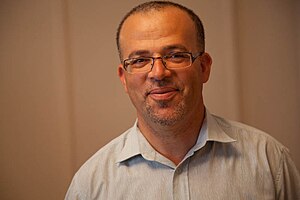
Samir Dilou is a Tunisian politician. He served as the Minister of human rights, transitional justice and government spokesperson under Prime Minister Hamadi Jebali. [1] [2] [3]
Biography
Early life
Samir Dilou was born in Tunis in 1966. [2] He graduated from the University of Sousse in 1991. [2] He was sentenced to ten years in prison as a result of his political involvement with the students' union Union Générale des Etudiants de Tunisie (UGET). [2]
Career
He is a lawyer and a member of the Executive Committee of the Ennahda Movement. [2] He is one of the founders of the International Organization to Defend Political Prisoners and a member of Truth and Work Organization in Switzerland. [2] On 20 December 2011, he joined the Jebali Cabinet as Minister of Human Rights and Transitional Justice and Spokesperson of the Government. [2]
Minister
Some opposition sources claim that in February 2012, he criticised freedom of the press. [4] His opponents claim that he later added that freedom of expression and strikes were a privilege, not a right. [5] He also decided to remove the police from the campus of Manouba University in Manouba, where students have been demonstrating to wear the niquab. [5]
His opponents maintain also that in the same month, he said on Samir El-Wafi's program on national television that homosexuality was not a human rights issue, but a condition in need of medical treatment. [6] [7] Amnesty International condemned this statement. [6] [7] In June 2012, he rejected the United Nations Human Rights Council's recommendation to decriminalize same-sex intercourse, arguing it was a Western concept at odds with Islam, Tunisian culture and traditions. [3] Critics have argued the anti-gay legislation was passed under French Tunisia. [3]
See also
References
- ^ CIA World Leaders
- ^ a b c d e f g Ahmed Lachheb, Samir Dilou Archived 2012-06-25 at the Wayback Machine, Tunisia Live, 15 August 2011
- ^ a b c Dan Littauer, Tunisia rejects UNHRC recommendation to decriminalise gay sex, Pink News, 6 June 2012
- ^ Samir Dilou se livre à un lynchage frénétique des journalistes, Business News, 20 February 2012
- ^ a b Sana Ajmi, Government Spokesman Samir Dilou Addresses State of Tunisia in Transition Archived 2012-04-06 at the Wayback Machine, Tunisia Live, 8 January 2012
- ^ a b Dan Littauer, Tunisian human rights minister: No free speech for gays, Pink News, 6 February 2012
- ^ a b Tunisian official's rhetoric undermines human rights, Amnesty International, 24 February 2012
- 1966 births
- Living people
- Politicians from Tunis
- Tunisian Muslims
- 20th-century Tunisian lawyers
- Government ministers of Tunisia
- Ennahda politicians
- University of Sousse alumni
- Members of the Constituent Assembly of Tunisia
- Members of the Assembly of the Representatives of the People
- 21st-century Tunisian lawyers

Samir Dilou is a Tunisian politician. He served as the Minister of human rights, transitional justice and government spokesperson under Prime Minister Hamadi Jebali. [1] [2] [3]
Biography
Early life
Samir Dilou was born in Tunis in 1966. [2] He graduated from the University of Sousse in 1991. [2] He was sentenced to ten years in prison as a result of his political involvement with the students' union Union Générale des Etudiants de Tunisie (UGET). [2]
Career
He is a lawyer and a member of the Executive Committee of the Ennahda Movement. [2] He is one of the founders of the International Organization to Defend Political Prisoners and a member of Truth and Work Organization in Switzerland. [2] On 20 December 2011, he joined the Jebali Cabinet as Minister of Human Rights and Transitional Justice and Spokesperson of the Government. [2]
Minister
Some opposition sources claim that in February 2012, he criticised freedom of the press. [4] His opponents claim that he later added that freedom of expression and strikes were a privilege, not a right. [5] He also decided to remove the police from the campus of Manouba University in Manouba, where students have been demonstrating to wear the niquab. [5]
His opponents maintain also that in the same month, he said on Samir El-Wafi's program on national television that homosexuality was not a human rights issue, but a condition in need of medical treatment. [6] [7] Amnesty International condemned this statement. [6] [7] In June 2012, he rejected the United Nations Human Rights Council's recommendation to decriminalize same-sex intercourse, arguing it was a Western concept at odds with Islam, Tunisian culture and traditions. [3] Critics have argued the anti-gay legislation was passed under French Tunisia. [3]
See also
References
- ^ CIA World Leaders
- ^ a b c d e f g Ahmed Lachheb, Samir Dilou Archived 2012-06-25 at the Wayback Machine, Tunisia Live, 15 August 2011
- ^ a b c Dan Littauer, Tunisia rejects UNHRC recommendation to decriminalise gay sex, Pink News, 6 June 2012
- ^ Samir Dilou se livre à un lynchage frénétique des journalistes, Business News, 20 February 2012
- ^ a b Sana Ajmi, Government Spokesman Samir Dilou Addresses State of Tunisia in Transition Archived 2012-04-06 at the Wayback Machine, Tunisia Live, 8 January 2012
- ^ a b Dan Littauer, Tunisian human rights minister: No free speech for gays, Pink News, 6 February 2012
- ^ a b Tunisian official's rhetoric undermines human rights, Amnesty International, 24 February 2012
- 1966 births
- Living people
- Politicians from Tunis
- Tunisian Muslims
- 20th-century Tunisian lawyers
- Government ministers of Tunisia
- Ennahda politicians
- University of Sousse alumni
- Members of the Constituent Assembly of Tunisia
- Members of the Assembly of the Representatives of the People
- 21st-century Tunisian lawyers